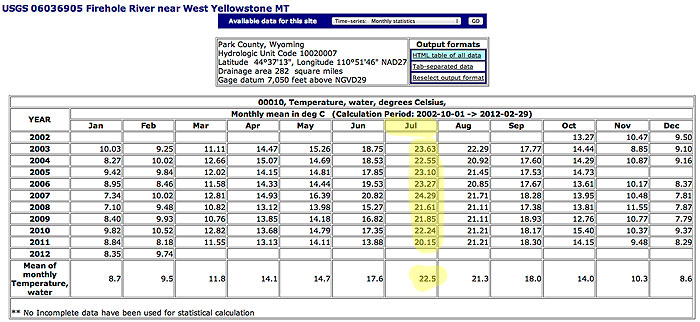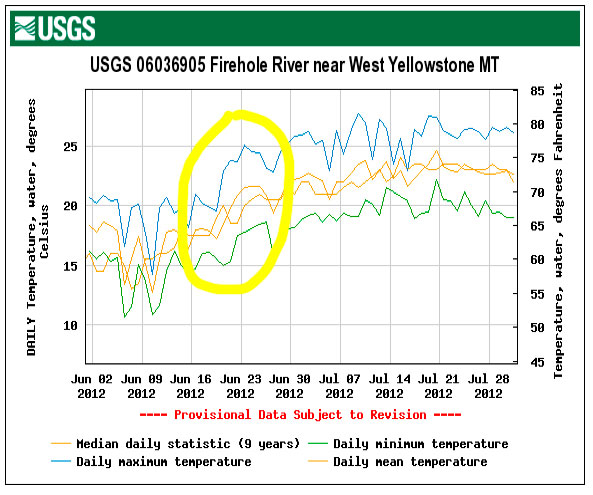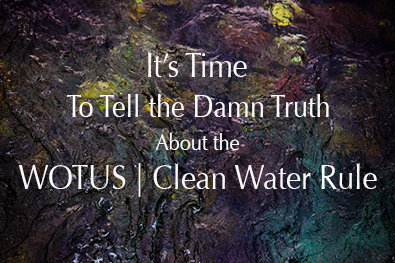 Several days ago friend of Chi Wulff and university prof Guide Jim emailed over part of a marketing email sent him by one of the large environmental advocacy groups in the country; they’ll today remain unnamed as they have a regional office in Bozeman, we’re awaiting a response to a query and we didn’t necessarily want to start a pissing match with a neighbor.
Several days ago friend of Chi Wulff and university prof Guide Jim emailed over part of a marketing email sent him by one of the large environmental advocacy groups in the country; they’ll today remain unnamed as they have a regional office in Bozeman, we’re awaiting a response to a query and we didn’t necessarily want to start a pissing match with a neighbor.
Their fundraising plea was crafted around the recent announcement of river closures in Yellowstone (the lower Firehole, lower Gibbon and Madison); here’s the quote that caught GJ’s (and our) attention:
“The hellacious summer of 2012 will go down in history as the year that Global Warming forever changed America. All-time record summer heat has forced the closure of some of the most beloved rivers in Yellowstone, with higher water temperatures recorded than any time in history, and will change them forever. Our research shows the situation is worse than reported and action must be taken now to save these rivers…..
That reported, I decided to take a quick look into the issue of whether or not this warm summer had actually produced water temperatures in Yellowstone significantly out of the ordinary. The summer heat of July and August almost always spikes temps in these waters rendering them unfishable.
Thankfully the USGS’s Water Resources site makes this sort of armchair analysis easy (though their site was down this morning at time of posting); I chose one of my personal favs the Firehole to look at in more detail.
It would appear the USGS has chosen to use daily mean water temps as their long term water temperature measure of record, therefore I pulled the 31 daily mean water temps from July 2012 and calculated their mean for the month – which was 22.7 C. (Edit – It was necessary to do so as the USGS takes several months to ‘certify’ the data and won’t post the July mean temp in the 10 year chart for several months – thanks JB for asking about this…).
That number was needed to make a meaningful comparison of this year’s water temperatures, specifically this year’s July water temperatures with the water temperature means of the 9 years prior (all the data that was available).
Though summarized in the table above, several points are worth mentioning here…
First, mean water temperatures on the Firehole weren’t record breaking this July, in fact, not really even close. July mean water temps were clearly higher in 2003, 2005, 2006 and 2007.
Second, July mean water temps were very close to this year’s data in 2004 and 2010, once again making the claim of ‘higher water temperatures than any time in history’ ring hollow.
Third, if you look at the temperature record from June and July this year as graphed below, water temperatures on the Firehole spiked significantly the week of June 17; the river closures should actually have been initiated then based on the data.
Why Yes Virginia, I Do Have a Point (Actually, Two)
One, and most importantly, we’re happy to once again join the chorus of fly fishers who argue that the Firehole, Lower Gibbon and YNP constrained Madison should be probably be closed every year (pending weather) from roughly mid-June through mid-September. The table above makes the argument pretty clearly and the bulk of fishers we hang out with self-impose a moratorium on the West-side Park waters every summer regardless of whether or not the rivers are ‘officially closed’.
Two, yes, it’s been a hot summer and yes we all know there’s a drought on impacting much of the country. That said, the frankly dishonest, data-disregarding, fear-mongering approach that some so-called advocacy groups are taking with weather and climate data this summer is scandalous, as exemplified by the above.
The name-calling, finger-pointing, chicken-little approach our neighbors used above might foster a trickle of fundraising, but it’s ain’t helping the process. Not at all.
It’s well past time for a ‘grown-up’ discussion on environmental stewardship in this country; it won’t be easy given the political state of the Union and the fact that, in the eyes of many, the nation is teetering on the brink of an economic cliff.
We stand with those fly fishers out there who think that clean water and intact fisheries are worth fighting for; it’s time to put away the crayons, wild exaggerations and school-yard banter and git ‘er done.



